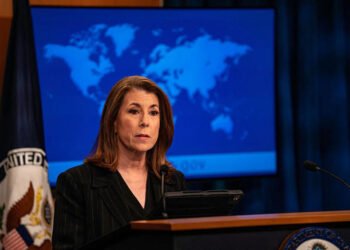The UK’s foreign secretary,Dominic Raab has called for new elections to be held in Belarus following a publication of an independent report into August’s contested ballot.
The UK, alongside 16 international partners, invoked the Moscow Mechanism at the Organization for Security and Co-operation in Europe (OSCE) in September which triggered an investigation by an independent human rights body, into electoral fraud and the inhuman violation of the rights of the Belarusian people.
In a statement, Dominic Raab said, “We pushed for this independent investigation and it has exposed the fraud at the heart of the presidential elections and the despicable actions taken by Lukashenko’s regime to suppress the Belarusian people.
“New elections which are free and fair must now be organised, and those responsible for the violence against demonstrators held to account.”
The Foreign Office said the report found August’s election had been “falsified” and that it exposed the extent of human rights violations committed by President Alexander Lukashenko.
It comes after police in Belarus fired stun grenades to disperse protesters ahead of a nationwide strike called by opposition leader Svetlana Tikhanovskaya last week.

Ms Tikhanovskaya, who is in exile in neighbouring Lithuania, had previously set out a “people’s ultimatum” for President Lukashenko to step down.
The Organisation for Security and Co-operation in Europe (OSCE) report said authorities were responsible for “massive and systematic human rights violations in response to peaceful demonstrations and protests”.
No one has been held accountable in what the report called a “climate of impunity” in which “the freedom of the media and the safety of journalists are under sustained attack by the Belarusian regime”.
Despite the intimidation, protests have taken place every weekend since the 9 August election, with as many as 100,000 people marching in the capital Minsk on 4th October.
Belarusian President, Alexander Lukashenko, has earlier threatened to cut off European transit routes across his country if sanctions are imposed by the international community.
Speaking during a visit to a dairy factory in the country’s east, Lukashenko said he would block European neighbours from shipping goods to Russia over Belarusian territory, and divert exports now shipped through ports in EU member, Lithuania.
“They got fat and forgot what Belarus is. And thought we could be frightened off with rockets and tanks. Well let’s see who is afraid of whom. We’ll show them what sanctions are,” he said.

Neighbouring Lithuania, Poland and Latvia have pushed for Europe to take stronger action against Lukashenko. Lithuania has also angered Lukashenko by hosting opposition presidential candidate, Sviatlana Tsikhanouskaya, who fled there to avoid being arrested.
Lithuanian presidential spokesman, Antanas Bubnelis said, “The president supports effective sanctions on Belarus, at European, regional and national levels. They are used as an answer to violence of government institutions and human rights violations in the country.”
The West has so far acted cautiously, balancing its push for new elections in Belarus with its concern over provoking intervention from Russia which supports President Lukashenko.




















